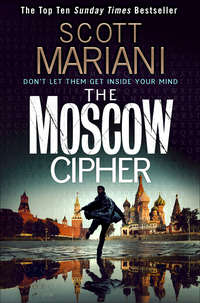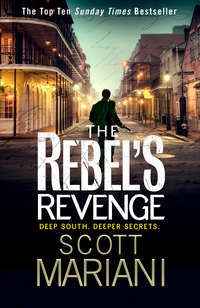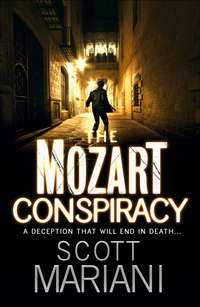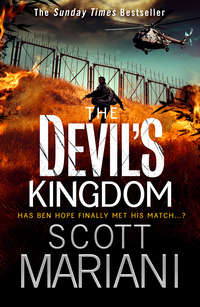
Полная версия
The Babylon Idol
He could think of four apart from his own. Four people whom Usberti would have blamed and never forgiven for their involvement in the affair. The first and most obvious was INTERPOL Commissioner Luc Simon, Ben’s main ally in bringing down Gladius Domini.
The next was Roberta Ryder, who had become entangled in the intrigue through no fault of her own and become Usberti’s target for assassination and kidnap, narrowly escaping with her life.
Then there was Father Pascal Cambriel, the elderly French priest who had sheltered Ben and Roberta at his humble village home after Ben had been shot, and ended up playing a key role.
And lastly there was Anna Manzini, the scholar and expert on the history of the Cathars, who had helped Ben unravel the bizarre background behind Usberti’s obsession with alchemy and after whom Usberti had sent his murderer Franco Bozza, to butcher her in her villa near Montségur in southern France. Like Roberta, Anna Manzini had had a close call and only just survived.
Usberti’s henchman Franco Bozza was out of the picture now. Ben had seen him get shot in the throat and die right in front of him. But the world was full of eager professional killers hungry for work, at the right price. And Massimiliano Usberti was a rich man, from an aristocratic family with enough property and investments to shield him from even the most catastrophic financial loss. If Severini was right, the fallen archbishop had his own twisted reasons for wanting to get even with all four people on the list, and the means to carry it out.
If Severini was right. If, if, if.
Everything depended on whether Ben could trust this crazy letter from a recovering mental patient living under massive psychological stress, who based his claim on a direct communication from heaven above. Either the guy was a nut, and Ben could throw the letter away, or he was for real, and Ben needed to act on it. There was very little middle ground between those two options, and no room for mistakes. He had to know more before he could let himself jump to conclusions. He swivelled his chair around to face the computer terminal on the desk. The sleeping screen flashed into life and he started urgently hitting keys.
The name Fabrizio Severini threw up a smattering of search engine results that were mainly old news archives related to the fall of Gladius Domini and the subsequent police investigation, the arrests, the court cases, the sentencing, the scandal that had rocked the church and drawn all kinds of censure from the Vatican. Ben didn’t see anything he hadn’t seen before.
But then he found something new.
The item was a cursory, low-key article from the Italian current affairs website La Repubblica, too insignificant to have been picked up by other news agencies. It took Ben only a second to read it: an announcement of the recent suicide of the disgraced former senior Church official Fabrizio Severini, found hanged in his cell at the Istituto Penitenziaro Bollati in Milano. Checking the reported date of his death, Ben saw that it had happened just three days after the postmark on the envelope. The letter might not even have reached Le Val by the time Severini’s body was discovered.
Ben didn’t know what to make of it. Had someone got to Severini, as he’d seemed to resign himself to the fact that they might? Or had the demons in his own mind got to him in the end? Again, it was impossible to tell.
Undecided, Ben ran another internet search, this time keying in the name Massimiliano Usberti. The computer did its thing, spat out its findings, and Ben found himself being taken back to La Repubblica and a report dated from just over six months earlier.
‘I’ll be damned,’ he muttered to himself.
The former archbishop Massimiliano Usberti, previously stripped of his title by the Vatican following allegations that he was the leader of a radical fundamentalist cult linked to suspected murders and racketeering, has died in a bizarre boating accident near his home on Lake Como. Usberti, who since his dismissal from the Church had filed for bankruptcy and been treated for depression and alcoholism, is believed to have fallen from the deck of a motor yacht and been caught up in the propellers, resulting in such extensive cranial and facial injuries that the coroner’s identification needed to be carried out using dental records …
The piece ended with a line or two about the private funeral ceremony that had taken place at Usberti’s family estate, where he had been laid to rest in the ancestral chapel.
If Ben felt any satisfaction from the news of Usberti’s death, it was swamped by his utter confusion about what was going on here. Sitting back in his chair he lit another cigarette and closed his eyes as he tried to puzzle it out logically. Le Val hadn’t existed when Ben and Usberti’s paths had crossed; so, for Severini to have traced him there and known where to address his letter, he must have been allowed some limited internet access by the relatively relaxed system at Bollati, and been able to Google Ben’s name just as Ben had done with Severini’s. The bookish, educated ex-clergyman was just the kind of inmate who would spend a lot of time in the prison library, enjoying the privilege of keeping up with what happened out there in the world.
Was it believable, then, that he wouldn’t have learned of his hated former employer’s death? Could such an important piece of news have gone unnoticed? Or had he been aware of the facts, but preferred to listen instead to the imaginary voices in his head telling him otherwise? Ben could well imagine that to be the case. If his suspicion was right, and if Severini was really nothing more than a poor raving lunatic racked with guilt and suffering from hallucinations and delusions, the letter was worthless junk and Ben was left with nothing.
It was rare for Ben to be lost for ideas, and even rarer for him to feel the need for another man’s counsel in a moment of crisis. But with his best friend in a coma and his mind jangling with confusion and fatigue, he badly needed to reach out to someone he could trust. He took out his battered old leather wallet, thumbed through the collection of business cards inside, and found the one that bore the blue-and-gold emblem of INTERPOL. He reached for the phone and dialled the direct line number on the card.
The evening was wearing on, but calling at this late hour didn’t matter. Luc Simon wasn’t the kind of guy to clock off when the factory whistle blew. He ate most of his meals at his desk, and probably slept there most nights: his wife would no doubt have confirmed that, before she’d got sick of being married to a ghost and left him for someone who could pay her a little more attention.
Luc’s phone answered on the second ring. ‘Bureau du Commissaire Simon.’
Ben said, ‘It’s me.’ He was about to say more, when he realised that the voice on the line was quite different from the smooth Gallic tone of Luc Simon’s. This man sounded older, coarser. And even more worn out with exhaustion than Ben felt.
‘Who’s calling?’ the voice asked.
Ben gave his name. ‘I was looking for the commissioner. This is his direct number, isn’t it?’
‘Yes, it is,’ the voice said, wearily, maybe slightly suspiciously.
‘Is he there? It’s okay. My name’s Ben Hope – he knows me. Check me on his database if you want.’
A silence. Then, ‘He’s not here. He’s gone.’
‘Gone?’ For Luc to have gone home before midnight would have been a record. For him to have left his job would have been unthinkable. ‘Gone where?’
The second silence on the line was heavier than the first, and it brought a chill that went down Ben’s spine and told him something was wrong.
‘If you know Commissioner Luc Simon,’ the voice said, laden with sadness, ‘then I regret to inform you that he is dead.’
Chapter 11
Ben couldn’t reply for several seconds. He wouldn’t have called Luc Simon a close friend, but they’d known each other a long time and collaborated on more than one occasion. The news hit him deep and low in the stomach. Finally he was able to say, ‘When this did happen?’
‘The commissaire didn’t come into work today, and didn’t respond to phone calls. As you know, he lived alone. We thought perhaps he had been taken ill. When agents visited his home this afternoon, they found him in his bathroom. He was stabbed to death in the shower, either this morning or last night, we don’t yet know for sure. Nobody knows anything,’ he added. ‘It’s chaos here. We’re putting together a press release, but so far—’
‘You have no idea who did it,’ Ben finished for him.
‘That is all I can tell you,’ the voice said. ‘I’m sorry.’
Ben muttered a word or two of thanks, then put the phone down. He was wishing he’d brought the bottle from the house, to help chase away the visions of a slashed shower curtain and blood-spattered tiles that were crowding into his mind. But there was no time to dwell over his shock and sorrow. Because Severini’s warning letter had just come back into sharp focus. Ben no longer cared if the guy was crazy or not. This was happening.
‘Roberta,’ he said out loud. His arm shot across the desk to snatch up the phone again.
When Ben had first met her, she’d been a struggling independent research scientist living in Paris. In the wake of the Gladius Domini affair she’d relocated to Ottawa and Dr Roberta Ryder had become Dr Roberta Kaminski, to protect her identity, and had slipped out of Ben’s life until she’d needed his help once again. The last time he’d seen her had been an emotional farewell in Indonesia, and even though he still had her mobile number he’d always avoided calling it. He knew why that was. The chemistry between them had been one of the factors behind his relationship breakdown with Brooke.
Ontario was six hours behind, making it afternoon there. ‘Come on,’ he muttered as the dial tone burred in his ear. Then his heart jumped as he heard her voice. ‘Roberta?’
‘Who is this?’ She sounded as if she was walking somewhere briskly. Always in a hurry, that Roberta Ryder.
‘It’s me.’
‘Ben? What—?’
‘Where are you?’
‘Carleton. Where else?’ Carleton University in Ottawa was where she taught now. ‘Freezing my ass off in the snow outside the main science block, about to head across campus to the cafeteria for a badly needed coffee before my next class begins in exactly twenty-four minutes’ time. If you really needed to know, which frankly is a mystery to me. But then, you always were one of life’s great mysteries, weren’t you?’
‘Are you okay?’
‘You sound weird, Ben. And why do I get the feeling this isn’t purely a social call?’
‘Just tell me. Are you okay?’
‘I was doing great, until a moment ago,’ she replied acerbically, and he could just see her, halted in the snow, one hand on her hip, one eyebrow raised, in that questioning way of hers. ‘Living the dream. Single, free and contented, and I gave up long ago waiting for you to call me. Yet now here you are. What’s the matter?’
‘I don’t have time to explain,’ he said. ‘Listen to me. You need to get out of town, right this minute.’
‘Wow. Not a word from you for months and years, now this. You really know how to lay the charm on a lady, Hope. In the desert of life, you are my mirage.’
‘I’m serious. Something’s happening. Don’t ask me what, because I don’t know. Just get away from there immediately.’
‘Are you nuts? Just like that? Get out of town, no explanations, no nothing? I have classes. I have a job, Ben.’
‘Never mind all that. You might not be safe and I need you to do as I say.’
‘Why – am – I – not – safe?’
‘Someone tried to get me. They got Luc Simon.’
‘The Paris cop? What do you mean, got?’
‘He wasn’t a Paris cop any more. And I mean, they killed him. They could be coming after you next.’
Her tone changed to one of shock. ‘What the hell’s happening? Are you okay?’
‘It’s not me I’m worried about. It’s you.’
‘I can look after myself,’ she said defiantly. ‘Remember?’
‘So can Jeff Dekker. But he’s lying in the hospital with a bullet hole in his chest, meant for me. These people aren’t messing about. How much money have you got on you?’
‘About seventy bucks. You are officially freaking me out right now. Is Jeff going to be all right? Who’s doing this?’
‘No more questions, Roberta,’ Ben interrupted. ‘Please, just do as I say. Don’t go back to your apartment. Grab all the cash you can from the campus ATM and jump on a bus. Keep changing buses, taxis, whatever you have to do to cover your trail. You see anyone following you, anything out of the ordinary, go straight to the police.’
‘Following me?’
‘Keep your eyes open. Head north into the mountains, where nobody can find you. Book into a hotel, cash, using a different name, and don’t do anything until I call you again. Promise me you’ll do that.’
‘Ben, I—’
‘I mean it, Roberta. I know how it sounds. But you have to promise me. I can’t have anything happen to you.’
‘Does this mean you love me after all?’
‘No jokes. Do it.’
‘Who said I was joking?’
‘I’ll be in touch.’
‘I’ve heard that one before. I can’t wait.’
‘Will you do it?’
‘YES! All right! I must be even crazier than I thought, but I’ll do it. This is going to cost you big-time, Ben Hope. Of all the goddamn lunatic things I ever did for y—’
He cut her off by ending the call. He could only pray she’d take him seriously. What was it with red-headed women? Without a doubt, she was the most stubborn, headstrong person he’d ever known. That was, besides himself.
The next name on Ben’s list was Father Pascal Cambriel. Ben had checked in on him now and then since the Gladius Domini business, mostly to ask after his health. Now in his mid-seventies, the old priest still lived in the same humble cottage in the little village of Saint-Jean in the south of France. A little slower, more dependent on his walking stick, but still active and enjoying his simple rural existence – feeding his chickens, tending to his little vineyard, kindling his fire and reading the Bible by candlelight every night as he puffed on his old briar pipe and indulged in more of his homemade wine than perhaps was good for him. Life didn’t change a great deal for Pascal Cambriel, including his tendency to not always answer the phone, a piece of modern technology the old man could take or leave. If he even possessed such a thing as a mobile, it wouldn’t survive the first battery discharge.
Ben dialled Pascal’s landline number. He wasn’t surprised when it rang and rang, but it didn’t allay his worry much either. Le Val to Saint-Jean was an eight-hour drive that Ben was prepared to make if he got no response that night.
In the meantime, he had one more name to check on the list.
Ben had lost contact long ago with the dusky, black-haired history professor Anna Manzini. The last time he’d seen her had been in the private hospital room, filled with the scent of scores of red and white roses, where she’d been recuperating after the violent assault by Franco Bozza that had nearly killed her. Ben had gone there to say goodbye and tell her how sorry he was that she’d become involved. Even bruised up from the attack, with a dressing on her right cheek where Bozza had slashed her with his knife, she’d managed to look beautiful.
That day, Anna had told him she’d had enough of France and was going back to live in Italy to take up her old university professorship. Her last whispered words to him, as he’d sat on her bedside and she kissed him tenderly on the cheek, had been: ‘If you ever find yourself in Florence, you must give me a call.’
Ben hadn’t found himself in Florence since then, and he didn’t have a number for her in any case. Returning to the computer, he Googled the Pagine Bianche, the white pages online phone directory for Italy. When the website came up he entered MANZINI and FIRENZE into a search box and punched TROVA. The computer came up with ‘30 Risultati trovati’, lots of Manzinis but not the one he was looking for. Unlisted. Damn.
Next he brought up the Florence University website and clicked open the faculty page to check through the list of academic staff. Unlikely that the university would divulge the phone details of faculty members, but there might be an email contact.
He found neither, because Anna Manzini was no longer listed there. Instead, he found her on a separate page for former faculty members, which gave no details at all except her name, department and the dates of her service. She’d left Florence University nearly two years ago.
It looked as though he’d lost her trail, until a new idea came to him. Anna had always been more than just an academic; she was a successful writer too, which was what had brought her to live in France in the first place, where she’d been researching a new project on the Cathars. ‘Who knows?’ she’d said to Ben during that last meeting. ‘Perhaps one day I’ll finish my book.’ When he widened his online search on her, Ben discovered her author website and found that she’d not only finished it, but that it had been a bestseller – the first of several successful works of historical non-fiction she’d churned out in the last few years. Her latest biography of the mystic, visionary, and polymath, Hildegard of Bingen, had sold quarter of a million copies.
Anna’s picture beamed at him from the screen. She’d been forty-two when he’d known her, but looked thirty-eight. She seemed not to have aged a day since. Either thanks to the wonders of plastic surgery, or else maybe the miracle of Photoshop, there wasn’t a trace of a scar from Usberti’s attempt to kill her. But selling a truckload of books wasn’t going to protect her from this renewed threat. Ben had to warn her, and fast.
Her author website gave no email address or social media handle, just a generic form. Frustrated, he filled it in, giving his mobile number and a brief note saying it was vital that she contacted him immediately. All he could do then was hope she’d respond.
He’d been sitting in the office far too long. The last thing he did before leaving was to try Pascal’s number again – to no avail.
‘Damn,’ he muttered. Then there was nothing else for it.
‘Let’s go,’ he said to Storm. The dog followed him as he sprinted back to the house. He ran upstairs to Tuesday’s room and banged on the door. Tuesday answered. The sound of Levi Roots’ reggae music was coming from his stereo in the background, but it didn’t seem to be cheering Tuesday up. He looked even glummer than before.
‘You can come out now. Brooke’s gone,’ Ben said.
‘I only wanted to give you guys some space.’
‘So we could rip each other’s guts out in private. Thanks. Listen, Tues. Remember I said about you having to hold the fort here? Well, you’re going to have to hold it a little longer. There’s been a development and I have to go.’
‘Go where?’ Tuesday said, blinking.
‘I’ll call you from the road,’ Ben replied. ‘Any news about Jeff, any news about anything at all, keep me updated.’
Tuesday said he would. Without another word, Ben hurried to his own quarters on the top floor of the rambling old house. It was a small, simple space, which he kept uncluttered with a minimum of belongings, as neat as a military dorm. He rummaged through his cupboard, then grabbed his battered green canvas bag. The old army haversack was permanent home to various items that tended to come in handy when Ben was on his travels, such as his mini-Maglite torch with LED upgrade for when he found himself in dark spots, and a roll of super-strong duct tape that was useful for anything from trussing up captives to making improvised field dressings. Ben stuffed in a couple of changes of underwear, two pairs of Helikon winter socks, the same ones the Norwegian Army used, a spare pair of black Levi’s and a heavy denim shirt identical to the one he was already wearing. From a box on the dresser he took a thick roll of cash without counting it, wrapped it up with his passport inside a double skin of two plastic Ziploc bags and tucked the package in on top of his spare clothes. Then he jammed in two packs of Gauloises, his whisky flask, and a can of fluid for his lighter.
Finally, there was the other item he kept hidden under the loose floorboard at the foot of the single bed: one piece of hardware that the anti-terror cops couldn’t confiscate, because no official knew it even existed. The nine-millimetre Taurus automatic had belonged to a Romanian drug dealer called Dracul, before Ben had commandeered the handgun as a trophy of war. He snicked a full magazine of Federal +P hollowpoints into its butt, cocked it and locked it and tucked it into the bag where he could get to it quickly. Because in situations like this, it was a lot better to have it and not need it, than to need it and not have it.
Three minutes later, Ben was jumping into the Alpina, flinging his bag onto the passenger seat, firing up the engine with a throaty blast and gunning the car out of Le Val’s yard.
Eight hours to Father Pascal’s village of Saint-Jean. He aimed to make it there in seven.
Chapter 12
Ben drove hard and fast through the night. Rain and sleet battered his windscreen, turned to snow for a while around Orléans, and then petered out again as he hammered southwards. He chain-smoked his way through the rest of his current pack of Gauloises, then broke into a fresh one. The strong, unfiltered cigarettes did little to settle his tension; the frenetic modern jazz station blasting from the Alpina’s sound system didn’t help much either.
Approaching Bourges, running low on fuel and energy, he pulled off the motorway into an aire de service. The night was chilly and damp. After he’d finished filling the tank, out of habit he parked the car in a corner of the rest area car park where it was shaded under the trees from the lights. He took his pistol from his bag and slipped it into his belt, behind the right hip where it was hidden by his jacket. Then he locked up the car and walked to the nearby all-night café and shop to get something to eat. He felt hollow and weary, yet jumpy and agitated. More conscious than usual of the hard steel lump of the gun nestling against the small of his back, he walked wide of any corners or doorways where an attacker could suddenly leap out. None did, but the edginess remained.
He walked into the café. It was warm inside. Tall windows offered a view of the brightly illuminated fuel station on one side, the darker car park on the other. Piped muzak was playing quietly in the background. There were a few late-night travellers taking a rest, some couples but mostly solitary men, sitting at plastic tables and desultorily sipping coffee while fiddling with phones or tablets. Nobody took any notice of Ben as he went in, but he eyed each one, sizing them up as though they could be a potential threat.
Maybe he was being paranoid, he thought. Or maybe he wasn’t. If the shooter had figured out by now that he’d got the wrong target, he could have hung around Le Val and picked up the trail of the Alpina. Ben was pretty sure nobody had followed him, but you could never be one hundred per cent certain of spotting a skilled tail. Especially when they worked in a team, relaying one another, keeping in contact by phone or radio, maintaining a constantly-shifting net of surveillance around their target. Ben had worked in enough of those teams himself to know exactly how they operated. If somehow Usberti was behind this – despite apparently being dead – then there was no telling how many paid guns he could have brought on board.
Ben bought a pack of sandwiches and a carry-out paper cup of steaming black coffee, paid cash and made his way back to the BMW. Nobody followed him. He locked himself inside the car, took the gun from his belt and laid it on the centre console close by his right hand. He tore open the sandwich pack: Gruyère cheese and pâté de campagne. His body craved food but he had no appetite. As he ate mechanically and slurped the hot coffee, he checked the latest news reports on his smartphone.







